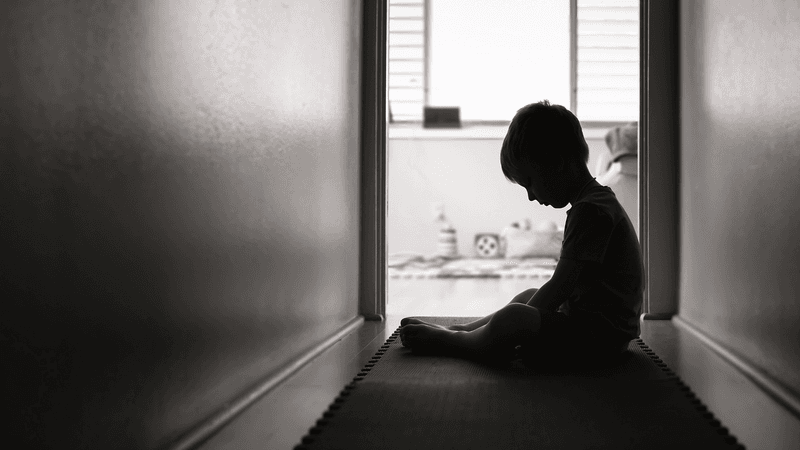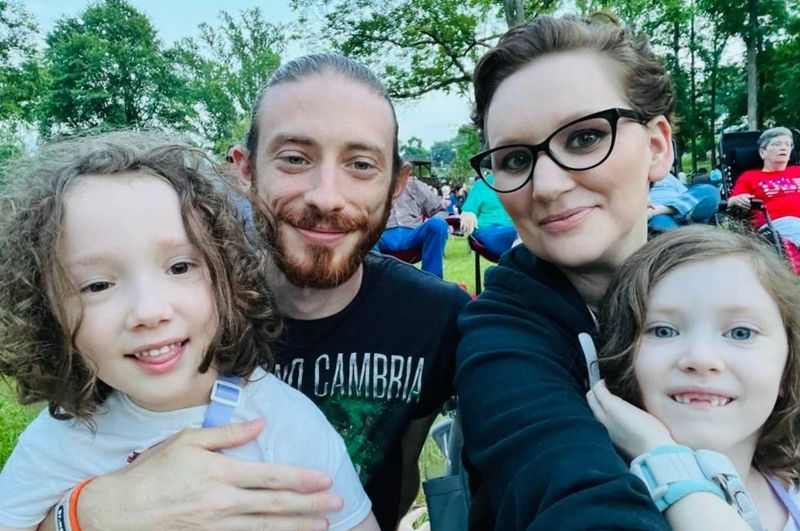Throughout childhood and into adulthood, those with absent parents carry silent burdens.
These are not merely thoughts; they are profound emotional experiences that shape behavior and perceptions of self-worth.
Each truth is a testament to a child’s resilience and the complex emotional landscape forged by absence. This blog post uncovers these truths, providing a voice to emotions often left unspoken.
1. Wondering What They Did Wrong
A child’s mind, so innocent and eager to please, often turns inward when faced with absence. The silence of a missing parent can echo louder than words, leading them to question their own worth.
In tender moments, they might wonder if their actions or words inadvertently pushed their parent away. The burden of believing they caused the absence can be heavy.
In adulthood, this question lingers, subtly shaping relationships and self-perception. It takes time and often help to shed this false responsibility. Yet, the journey to self-forgiveness is a brave and significant one.
The path forward involves recognizing that a parent’s absence is not a reflection of their value. Finding peace requires understanding and compassion for oneself, acknowledging that some questions may remain unanswered, and that’s okay. Their story is valid and deserves to be heard.
2. Feeling the Absence During Milestones
Milestones are markers of achievement and growth. But for some, these celebrations carry a shadow. Each birthday, graduation, or celebration is tinged with the absence of someone crucial. It’s a bittersweet dance of joy and longing.
The missing presence is felt acutely when they look around, searching for a familiar face that never appears. It’s a reminder of love that should have been there. As friends and family cheer, there’s a quiet space in their heart where a parent’s voice should resonate.
The emptiness can be overwhelming, yet, within it lies resilience. They learn to find strength in themselves and those who choose to stand beside them. It takes courage to celebrate despite the void, to acknowledge joy amidst the longing. This strength is a testament to their spirit, growing ever stronger in the face of absence.
3. Overachieving or Self-Destructing
They strive to prove something—to themselves, the world, and the parent who isn’t there. This drive can manifest as relentless overachievement. Success becomes a salve for the wound left by absence. It’s a pursuit for validation, a way to matter.
Conversely, some may spiral into self-destruction. Filling the void with chaos feels like an answer, even if it’s temporary. Both paths are about seeking worth in a world where they felt disregarded.
Understanding these behaviors is key to healing. Recognizing the need for validation or chaos is the first step toward finding healthier outlets. Embracing imperfection and acknowledging their intrinsic worth, free from external achievements or failures, becomes the ultimate goal. They are worthy, always were, even without proving it to anyone else.
4. Craving Validation Like Oxygen
Validation is the balm for their insecurity. Without it, they might feel as though they’re suffocating under the weight of insignificance. Each compliment, each award, is a breath of fresh air. It’s a temporary assurance that they matter, at least for now.
But this need can become consuming. It’s not just about recognition; it’s about survival. They seek approval from every corner, hoping it will fill the void left by a parent who never showed up to say, “I’m proud of you.”
Realizing that their worth isn’t contingent on external validation is a profound journey. It’s learning to breathe freely, to affirm oneself in the quiet moments when no one else is watching. The path to self-validation is a courageous one and leads to a deeply rooted sense of self-worth that cannot be easily shaken.
5. Trust Issues That Don’t Make Sense
Trust is a fragile thing, especially when it’s been broken early on. When a parent doesn’t show up, it plants seeds of doubt. It’s a narrative that says people can leave without notice, and promises can be empty.
This leads to a cautious approach to relationships. They may question intentions and doubt sincerity, even when there’s no need. It’s a defense mechanism, a way to protect against further disappointment.
In time, they may learn to differentiate between past and present. Trust is rebuilt slowly, through experience and understanding. Accepting that not everyone will leave can be liberating. It’s about opening up to the possibility that some relationships can be as enduring as they deserve. Healing happens as they give trust a chance, little by little, with those who’ve earned it.
6. Assuming Love Has Conditions
When love feels conditional, it’s like walking a tightrope. They learn to associate love with achievement and approval. It’s not freely given—it’s earned, or so they believe. The stakes are high, and they tread carefully, fearing missteps.
This mindset often follows them into adulthood, coloring their relationships. They might feel like they have to prove their worth continuously, fearing that love could be withdrawn at the slightest misstep.
Breaking free from this belief is a journey toward understanding that love, true love, doesn’t come with strings attached. It’s about embracing vulnerability and trusting that they’re enough just as they are. Gradually, they learn that love can be unconditional, a sanctuary where they can lay their burdens down and just be.
7. Fearing Being ‘Too Much’ or ‘Not Enough’
In the echo of absence, they might grapple with their self-image. Are they too needy, too loud, too much for someone to love? Or perhaps they’re not enough—lacking the qualities that would make them lovable. It’s a silent dialogue that plays out within.
These fears can dictate how they present themselves to the world. They might shrink away, trying to be less visible, or overcompensate, striving to be seen, to matter. It’s a balancing act, trying to fit into a mold that feels elusive.
The path to self-acceptance is about dispelling these myths. Recognizing their inherent worth and embracing their full spectrum of emotions and traits is liberating. They learn that they are just right, perfectly imperfect, and deserving of love for being exactly who they are.
8. Carrying Guilt for Needing Things Never Given
Guilt can be an intricate companion when needs go unmet. They might feel guilty for wanting emotional support, nurturing, or attention that was never fully there. It’s as if their needs were a burden, something to apologise for.
As they grow, this guilt can manifest in reluctance to ask for help or express needs in relationships. It’s a learned behavior, to minimize themselves, to not ‘bother’ others with what feels like too much.
But recognizing that everyone has needs, and that it’s okay to voice them, is essential. It’s part of the healing process, understanding that their desires for connection and support are valid. They learn to let go of guilt, embracing the right to be cared for and cherished, just as they are.
9. Questioning What Real Love Is Supposed to Feel Like
Love can feel like an enigma when its basics weren’t modeled. They wonder what real love should be—how it should look, feel, or manifest. It’s a puzzle without a clear picture, leaving them to piece it together.
Movies, books, and others’ relationships offer glimpses but often fall short of providing the complete understanding they crave. This journey is deeply personal, filled with trials and errors as they navigate their own definitions.
Over time, they learn to trust their instincts, to feel love in its purest forms, not just through grand gestures, but in small, meaningful connections. They discover that love is multifaceted, with room for imperfections and growth. It’s about finding their own rhythm and recognizing love as it happens, in the quiet, everyday moments.
10. Feeling Invisible in Rooms Where Others Shine
In spaces filled with laughter and life, they might stand in the periphery, feeling unseen. It’s as if they’re a ghost, observing but not quite participating. The absence of a parent reinforces this invisibility, a nagging thought that they don’t quite belong.
This sense of invisibility can seep into social and professional settings, where they might hesitate to step forward or voice their thoughts. It’s a protective mechanism, a way to avoid rejection or disappointment.
Yet, stepping into their own light is a powerful act. Embracing their unique presence and allowing themselves to be seen fosters a deeper understanding of self-value. They learn to take up space, to dance in their own spotlight, realizing that invisibility is a shadow they can choose to leave behind.
11. Bonding Deeply with Others Who Know Absence
Shared experiences of absence can forge profound connections. There’s an unspoken understanding between those who’ve walked similar paths. It’s a bond formed in the quiet spaces of empathy and shared stories.
These relationships can be healing, providing a mirror to one’s own experiences. They create a safe haven to express emotions without fear of judgment. It’s companionship in its truest form, where silence speaks volumes.
In these connections, they find strength and solidarity. They learn that it’s okay to lean on others, to build a support network that understands the weight of absence. These relationships become a cornerstone of healing, reminding them that they are not alone in their journey.
12. Flinching at Inconsistency—Emotionally or Physically
Inconsistency creates a landscape of uncertainty. Each unpredictable moment can be unsettling, leading to a heightened awareness of changes in behavior or emotion. It’s a survival instinct, honed by experiences where reliability was absent.
They might flinch—physically or emotionally—at sudden changes, preparing for the worst. It’s a cautionary stance, a shielding from disappointment or pain that inconsistency often brings.
Over time, they learn to navigate these waters with a steady heart. Understanding that not all shifts signal danger becomes crucial. Establishing boundaries and finding solace in predictable patterns can bring a sense of control and security. They gradually embrace the peace that consistency can offer, allowing themselves to trust in the stability others provide.
13. Confusing Chaos for Passion, Silence for Rejection
Chaos and silence can speak louder than words. In absence, they might find themselves drawn to tumultuous relationships, mistaking chaos for passion. It’s an adrenaline rush, a semblance of the attention they craved.
Conversely, silence can feel like rejection, a reminder of times when presence was a luxury they couldn’t afford. It’s a void that echoes loudly, stirring fears of not being enough.
Discovering the balance is key. Learning that true passion doesn’t equate to chaos, and that silence can simply be a pause for reflection, is liberating. They start to redefine relationships, seeking harmony and understanding. It’s a journey towards recognizing that love can be gentle, and silence doesn’t always signify absence.
14. Grieving the Relationship That Could’ve Been
Grief for what never was can be as potent as grief for what was lost. They might find themselves mourning a relationship they wished for, the one that could have been filled with shared moments and unconditional love.
This grief is unique, layered with longing and imagined possibilities. It’s a silent mourning, for dreams unrealized and conversations never had. It’s about letting go of what might have been, to embrace the present.
Finding peace in this grief involves acceptance. Acknowledging the pain and allowing oneself to feel is crucial. Over time, they learn to cherish the memories they’ve created and the relationships they’ve built. Healing comes as they honor both the reality and the dreams, with grace and understanding.
15. Stopping Asking Questions When Answers Never Come
When questions go unanswered, curiosity can wither away. As children, they may have asked why, hoping to unravel the mystery of absence. But when answers don’t come, they learn to hold their questions close.
This silence can carry into adulthood, a hesitance to ask for clarity or understanding, fearing disappointment. It’s a protective shell, a way to shield from the vulnerability of unfulfilled expectations.
However, there’s strength in rekindling that curiosity. Learning to ask again, to seek understanding, opens doors to deeper connections and self-awareness.
They find courage in the act of questioning, realizing that even without answers, the journey of inquiry is worthwhile. It’s about embracing the unknown with an open heart, knowing that some mysteries unfold in their own time.
16. Parenting Themselves More Than They Should Have
When a parent doesn’t show up, children often step into roles beyond their years. They become their own caretakers, learning to navigate life with a maturity that belies their age. It’s a resilience born of necessity, yet it comes at a cost.
These young caretakers might excel in independence but crave the guidance they provide to themselves. It’s a balancing act, managing responsibilities while yearning for the support they give others.
In adulthood, they learn to embrace their inner child, to nurture the parts of themselves that grew up too fast. It’s about finding support in others and allowing themselves the freedom to be cared for. They learn that strength doesn’t mean carrying everything alone; it’s about knowing when to lean on others, too.

















